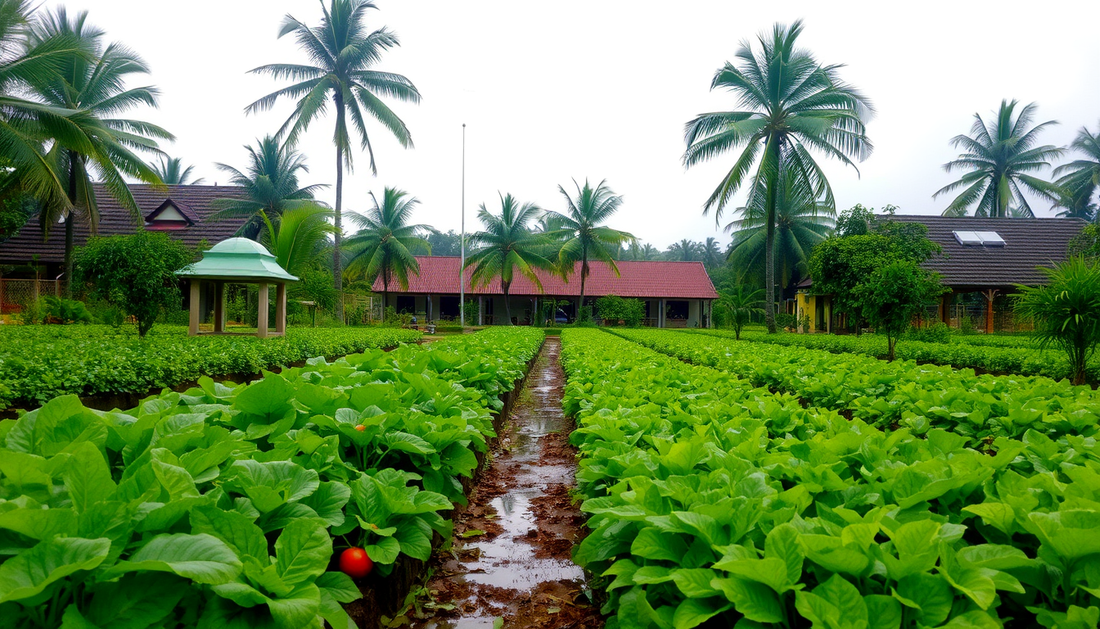
The Best Season for Vegetable Gardening in Bangalore
As the sun rises over the bustling city of Bangalore, the air is filled with the promise of a new season. For gardeners and green-thumbed enthusiasts, this is a time of excitement and anticipation, as the changing weather patterns signal the perfect time to embark on a journey of bountiful vegetable harvests.
In Bangalore, the climate is a unique blend of tropical and temperate influences, creating a gardening landscape that is both challenging and rewarding. Understanding the best season for vegetable gardening in this vibrant city is the key to unlocking the full potential of your green oasis.
The Rhythm of the Seasons
Bangalore's climate is characterized by distinct seasons, each with its own unique opportunities and considerations for the aspiring vegetable gardener. The year can be broadly divided into three primary seasons: the cool and dry season, the hot and dry season, and the monsoon season.
The Cool and Dry Season (November to February)
This is the prime time for vegetable gardening in Bangalore. The mild temperatures, ranging from a comfortable 20°C to 28°C, and the low humidity create an ideal environment for a wide variety of vegetables to thrive. During this season, you can expect to see an abundance of leafy greens, root vegetables, and cool-weather crops such as carrots, radishes, and broccoli.
One of the key advantages of the cool and dry season is the reduced risk of pest infestations and disease outbreaks. The cooler temperatures and drier conditions make it less favorable for many common garden pests and pathogens, allowing your vegetables to grow strong and healthy.
The Hot and Dry Season (March to May)
As the summer months approach, the temperatures in Bangalore can soar, often reaching as high as 35°C. This can be a challenging time for vegetable gardening, as the intense heat and low rainfall can stress plants and limit their growth potential.
During this season, it's important to focus on heat-tolerant and drought-resistant varieties of vegetables, such as okra, eggplant, and certain types of tomatoes. Proper water management, shading, and mulching techniques become crucial to ensure the survival and thriving of your vegetable garden.
The Monsoon Season (June to October)
The arrival of the monsoon season in Bangalore brings with it a dramatic shift in the gardening landscape. The heavy rains, high humidity, and moderate temperatures create an environment that is both beneficial and challenging for vegetable gardeners.
On the positive side, the monsoon season provides ample moisture for plant growth, reducing the need for frequent watering. However, the increased humidity and rainfall can also lead to an increased risk of fungal diseases and pest infestations. Careful selection of monsoon-friendly vegetable varieties and the implementation of disease-prevention strategies are essential during this time.
Maximizing Your Vegetable Garden's Potential
To make the most of the best season for vegetable gardening in Bangalore, it's important to plan and prepare your garden accordingly. Here are some key considerations:
Crop Selection
Choose vegetable varieties that are well-suited to the specific season and climate conditions in Bangalore. During the cool and dry season, focus on cool-weather crops, while the hot and dry season calls for heat-tolerant varieties. For the monsoon season, select disease-resistant and moisture-loving vegetables.
Planting Schedules
Time your planting and sowing activities to align with the optimal growing conditions for each season. For example, in the cool and dry season, you can start your seedlings earlier and transplant them into the garden, while the monsoon season may require a later planting schedule to avoid waterlogged soil.
Soil Preparation
Ensure that your garden soil is well-draining and nutrient-rich to support the specific needs of your seasonal vegetables. During the dry seasons, focus on improving water-holding capacity, while the monsoon season may require measures to enhance drainage and aeration.
Irrigation and Mulching
Adapt your watering practices to the seasonal conditions. The cool and dry season may require more frequent watering, while the monsoon season may call for reduced irrigation and the use of mulch to retain soil moisture.
Pest and Disease Management
Implement integrated pest management strategies that are tailored to the seasonal challenges. During the cool and dry season, you may need to be vigilant for pests, while the monsoon season may require a focus on fungal disease prevention.
By understanding the rhythms of Bangalore's seasons and aligning your vegetable gardening practices accordingly, you can unlock the full potential of your green oasis and enjoy a bountiful harvest throughout the year.
Seasonal Planting Guide for Bangalore
To help you plan your vegetable garden in Bangalore, here's a comprehensive seasonal planting guide:
Cool and Dry Season (November to February)
- Leafy greens: Spinach, kale, lettuce, Swiss chard
- Root vegetables: Carrots, radishes, beets, turnips
- Brassicas: Broccoli, cauliflower, cabbage, Brussels sprouts
- Legumes: Peas, beans
- Herbs: Cilantro, parsley, rosemary, thyme
Hot and Dry Season (March to May)
- Heat-tolerant vegetables: Okra, eggplant, tomatoes, peppers
- Cucurbits: Cucumbers, melons, squash
- Leafy greens: Amaranth, purslane, New Zealand spinach
- Herbs: Basil, mint, lemongrass
Monsoon Season (June to October)
- Leafy greens: Amaranth, water spinach, Indian spinach
- Legumes: Cowpeas, lablab beans
- Cucurbits: Bottle gourd, snake gourd, ridge gourd
- Herbs: Ginger, turmeric, lemongrass
Remember, this is a general guide, and you may need to adjust your planting schedule based on the specific microclimate and weather patterns in your area. Consult with local gardening experts or resources to fine-tune your seasonal planting strategy for the best results.
Happy gardening in Bangalore!






No comments